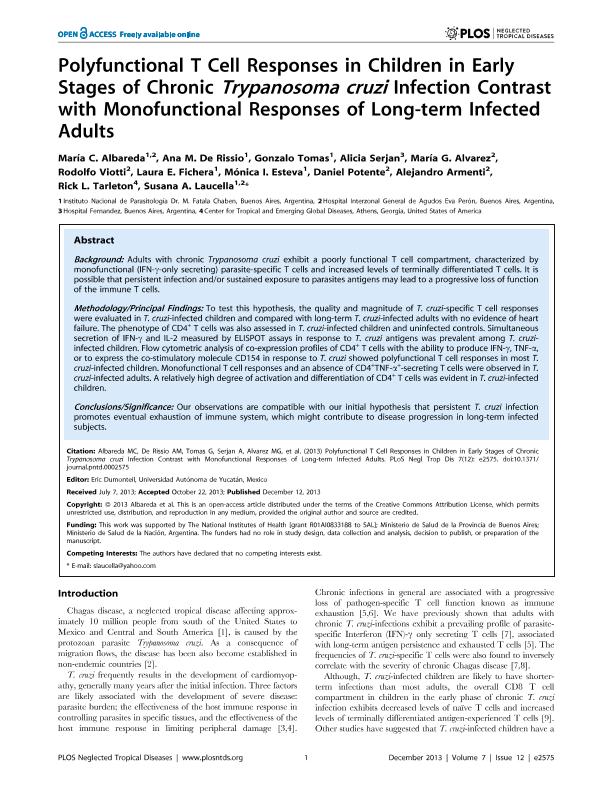Artículo
Polyfunctional T cell responses in children in early stages of chronic Trypanosoma cruzi infection contrast with monofunctional responses of long-term infected adults
Albareda, María Cecilia ; de Rissio, Ana María; Tomas, Gonzalo; Serjan, Alicia; Alvarez, María Gabriela; Viotti, Rodolfo Jorge; Fichera, Laura Edith
; de Rissio, Ana María; Tomas, Gonzalo; Serjan, Alicia; Alvarez, María Gabriela; Viotti, Rodolfo Jorge; Fichera, Laura Edith ; Esteva, Mónica Inés; Potente, Daniel Fernando; Armenti, Alejandro; Tarleton, Rick L.; Laucella, Susana Adriana
; Esteva, Mónica Inés; Potente, Daniel Fernando; Armenti, Alejandro; Tarleton, Rick L.; Laucella, Susana Adriana
 ; de Rissio, Ana María; Tomas, Gonzalo; Serjan, Alicia; Alvarez, María Gabriela; Viotti, Rodolfo Jorge; Fichera, Laura Edith
; de Rissio, Ana María; Tomas, Gonzalo; Serjan, Alicia; Alvarez, María Gabriela; Viotti, Rodolfo Jorge; Fichera, Laura Edith ; Esteva, Mónica Inés; Potente, Daniel Fernando; Armenti, Alejandro; Tarleton, Rick L.; Laucella, Susana Adriana
; Esteva, Mónica Inés; Potente, Daniel Fernando; Armenti, Alejandro; Tarleton, Rick L.; Laucella, Susana Adriana
Fecha de publicación:
12/2013
Editorial:
Public Library of Science
Revista:
Neglected Tropical Diseases
ISSN:
1935-2735
Idioma:
Inglés
Tipo de recurso:
Artículo publicado
Clasificación temática:
Resumen
Background: Adults with chronic Trypanosoma cruzi exhibit a poorly functional T cell compartment, characterized by monofunctional (IFN-γ-only secreting) parasite-specific T cells and increased levels of terminally differentiated T cells. It is possible that persistent infection and/or sustained exposure to parasites antigens may lead to a progressive loss of function of the immune T cells. Methodology/Principal Findings: To test this hypothesis, the quality and magnitude of T. cruzi-specific T cell responses were evaluated in T. cruzi-infected children and compared with long-term T. cruzi-infected adults with no evidence of heart failure. The phenotype of CD4+ T cells was also assessed in T. cruzi-infected children and uninfected controls. Simultaneous secretion of IFN-γ and IL-2 measured by ELISPOT assays in response to T. cruzi antigens was prevalent among T. cruzi-infected children. Flow cytometric analysis of co-expression profiles of CD4+ T cells with the ability to produce IFN-γ, TNF-α, or to express the co-stimulatory molecule CD154 in response to T. cruzi showed polyfunctional T cell responses in most T. cruzi-infected children. Monofunctional T cell responses and an absence of CD4+TNF-α+-secreting T cells were observed in T. cruzi-infected adults. A relatively high degree of activation and differentiation of CD4+ T cells was evident in T. cruzi-infected children. Conclusions/Significance: Our observations are compatible with our initial hypothesis that persistent T. cruzi infection promotes eventual exhaustion of immune system, which might contribute to disease progression in long-term infected subjects.
Palabras clave:
Trypanosoma Cruzi
,
Ifn-Gamma
,
Chagas
,
T Cells
Archivos asociados
Licencia
Identificadores
Colecciones
Articulos(SEDE CENTRAL)
Articulos de SEDE CENTRAL
Articulos de SEDE CENTRAL
Citación
Albareda, María Cecilia; de Rissio, Ana María; Tomas, Gonzalo; Serjan, Alicia; Alvarez, María Gabriela; et al.; Polyfunctional T cell responses in children in early stages of chronic Trypanosoma cruzi infection contrast with monofunctional responses of long-term infected adults; Public Library of Science; Neglected Tropical Diseases; 7; 12; 12-2013; 1-9; e2575
Compartir
Altmétricas



